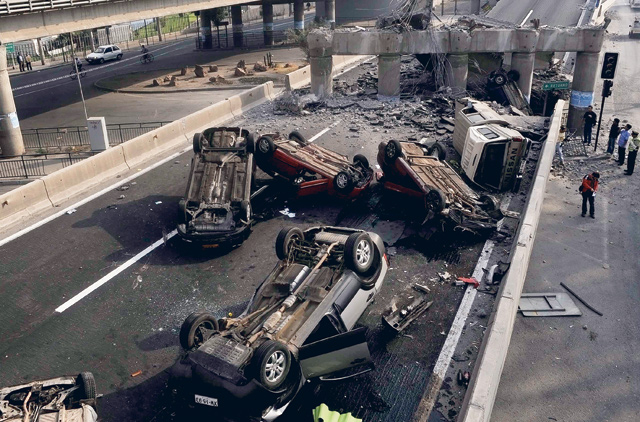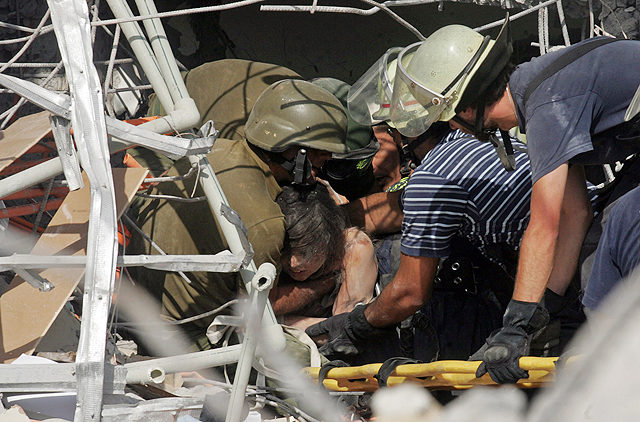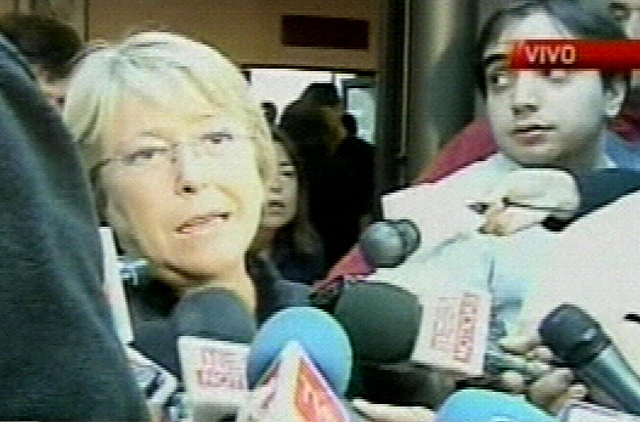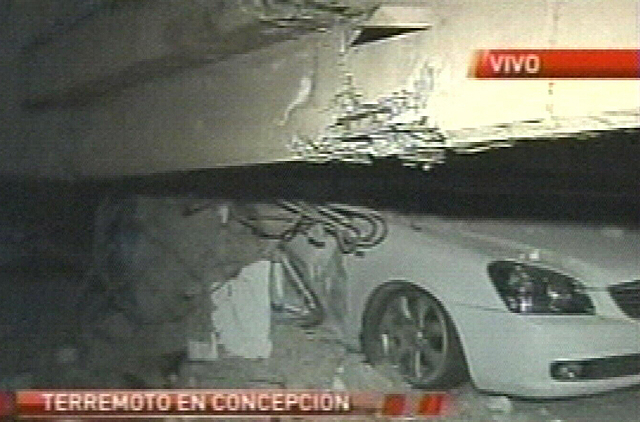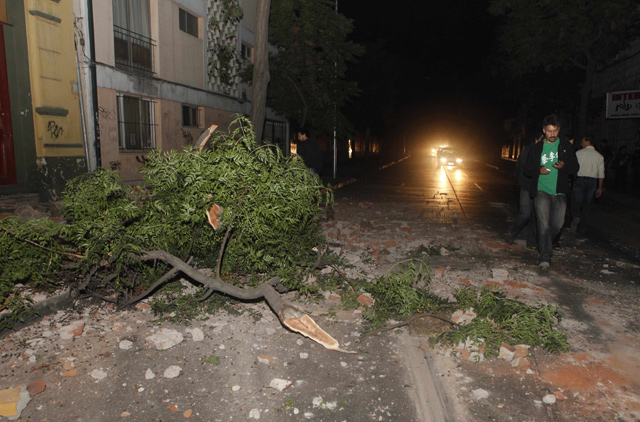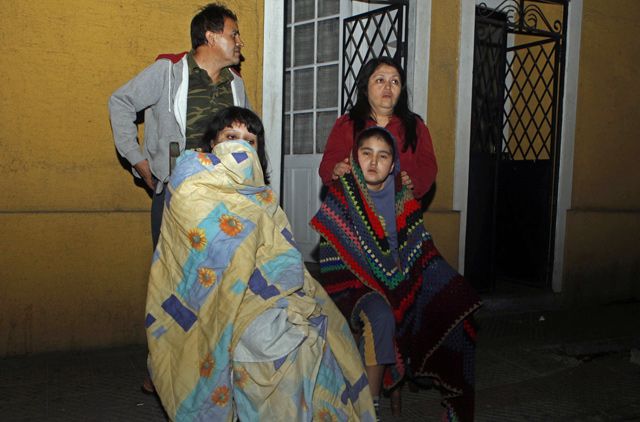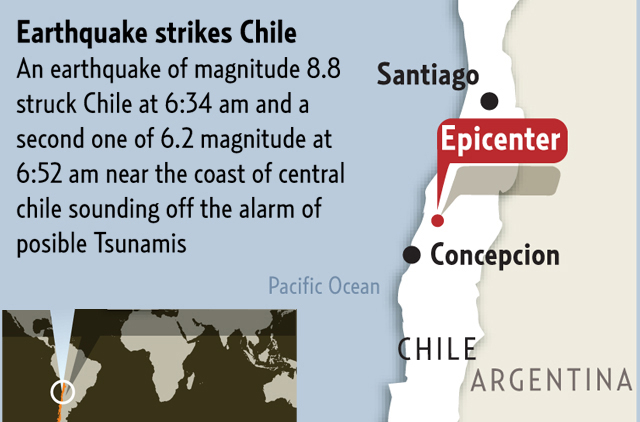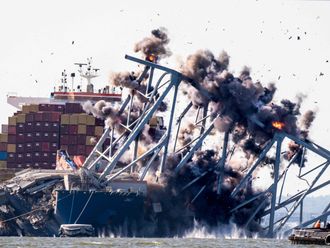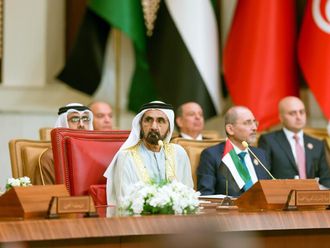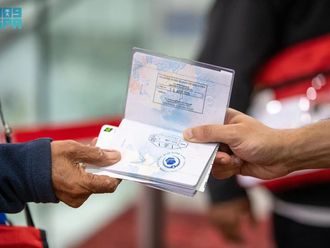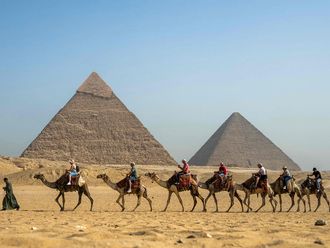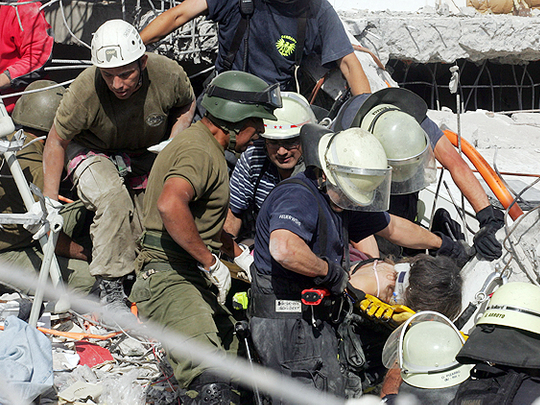
Concepcion, Chile: Chile's president sent the army to help police attack looting on Sunday and appealed for international help in the wake of an earthquake that shattered cities and killed at least 708 people.
President Michelle Bachelet announced the sharply higher new death toll after a six-hour meeting with aides and emergency officials struggling to cope with one of the most powerful earthquakes in centuries.
"We face a catastrophe of such unthinkable magnitude that it will require a giant effort" for Chile to recover, Bachelet told a news conference at the presidential palace, which itself suffered minor cracks in Saturday's magnitude-8.8 quake.
She said that a growing number of people were listed as missing and she signed a decree giving the military over security in the province of Concepcion, where looters have pillaged supermarkets, gas stations, pharmacies and banks.
The president, who leaves office on March 11, also said the country would accept some of the offers of aid that have poured in from around the world.
She said the country needs field hospitals and temporary bridges, water purification plants and damage assessment experts - as well as rescuers to help relieve workers who have been laboring frantically for more than a day.
Officials earlier had said about 300 were known dead, with 500,000 homes severely damaged.
A tsunami caused by the quake that swept across the Pacific killed several people on a Chilean island and devastated over coastal communities near the epicenter, but caused little damage in other countries, after precautionary evacuations of hundreds of thousands of people. The tsunami warning was lifted a day after the earthquake.
Police said more than 100 people died in Concepcion, the largest city near the epicenter with more than 200,000 people. The university was among the buildings that caught fire around the city as gas and power lines snapped. Many streets were littered with rubble from edifices and inmates escaped from a nearby prison.
Police used water cannon and tear gas to scatter people who forced open the doors of the Lider supermarket in Concepcion, hauling away everything from diapers to dehydrated milk to a kitchen stove.
Across the Bio Bio River in San Pedro, others cleared out a shopping mall. A video store was set ablaze, two automatic teller machines were broken open, a bank was robbed and a supermarket emptied, its floor littered with mashed plums, scattered dog food and smashed liquor bottles.
The largest building damaged in Concepcion was a newly opened 15-story apartment that toppled backward, trapping an estimated 60 people inside apartments where the floors suddenly became vertical and the contents of every room slammed down onto rear walls.
"It fell at the moment the earthquake began," said 4th Lt. Juan Schulmeyer of Concepcion's 7th Firefighter Company, pointing to where the foundation collapsed. A full 24 hours later, only 16 people had been pulled out alive, and six bodies had been recovered.
Rescuers heard a woman call out at 11 p.m. on Saturday from what seemed like the 6th floor, but hours later they were making slow progress in reaching her. Rescuers were working with two power saws and an electric hammer on a generator, but their supply of gas was running out and it was taking them a frustrating hour and a half to cut each hole through the concrete.
"It's very difficult working in the dark with aftershocks, and inside it's complicated. The apartments are totally destroyed. You have to work with great caution," said Paulo Klein, who was leading a group of rescue specialists from Puerto Montt. They flew in on an air force plane with just the equipment they could carry. Heavy equipment was coming later along with 12 other rescuers.
The quake tore apart houses, bridges and highways, and Chileans near the epicenter were thrown from their beds by the force of the mega-quake, which was felt as far away as Sao Paulo in Brazil - 2,900 kilometres to the east.
The full extent of damage remained unclear. Ninety aftershocks of magnitude 5 or greater shuddered across the disaster prone Andean nation within 24 hours of the initial quake. One was nearly as powerful as Haiti's devastating Jan. 12 earthquake.
In the village of Reumen, a tractor trailer slammed into a dangling pedestrian overpass and 40 tons of concrete and steel crunched the truck, covering Chile's main highway with smashed grapes, tomatoes and cucumbers - one of several overpasses toppled along the highway.
Truck driver Jaime Musso, 53, thought his truck was being buffeted by strong winds and by the time he saw the overpass hanging down over Highway 5 there was no chance of stopping, so he aimed for the spot where he thought he would cause the least damage and brought down the overpass onto his truck. He said he survived "by millimeters."
As night fell on Saturday, about a dozen men and children sat around a bonfire in the remains of their homes in Curico, a town 196 kilometres south of the capital, Santiago.
"We were sleeping when we felt the quake, very strongly. I got up and went out the door. When I looked back my bed was covered in rubble," said survivor Claudio Palma.
In the capital Santiago, 325 kilometres to the northeast of the epicenter, the national Fine Arts Museum was badly damaged and an apartment building's two-story parking lot pancaked, smashing about 50 cars.
Santiago's damaged airport managed to receive five flights on Sunday, though no outbound flights were possible. The subway also partially reopened.
Chile's main seaport, in Valparaiso, was closed while damage was assessed. Two oil refineries shut down. The state-run Codelco, the world's largest copper producer, halted work at two of its mines, but said it expected them to resume operations quickly.
The jolt set off a tsunami that swamped San Juan Bautista village on Robinson Crusoe Island off Chile, killing at least five people and leaving 11 missing, said Guillermo de la Masa, head of the government emergency bureau for the Valparaiso region.
On the mainland, several huge waves inundated part of the major port city of Talcahuano, near hard-hit Concepcion. A large boat was swept more than a block inland.
State television showed scenes of devastation in coastal towns, where houses were blasted away by water, leaving scraps of wood and metal - and complaints of homeless quake victims that officials had not yet brought water or food.
The surge of water raced across the Pacific, setting off alarm sirens in Hawaii, Polynesia and Tonga, but the tsunami waves proved small and did little damage as they reached as far as Japan.
Robert Williams, a geophysicist at the US Geological Survey, said the Chilean quake was hundreds of times more powerful than Haiti's magnitude-7 quake, though it was deeper and cost far fewer lives.
The largest earthquake ever recorded struck the same area of Chile on May 22, 1960. The magnitude-9.5 quake killed 1,655 people and made 2 million homeless. Saturday's quake matched a 1906 temblor off the Ecuadorean coast as the seventh-strongest ever recorded in the world.
Developments at a glance
Airport closed: Chile’s Santiago airport has been shut down and will remain closed for at least the next 24 hours. Airport director Eduardo del Canto told Chilean television in a telephone interview Saturday that the airport's passenger terminal has suffered major damage.
Hawaii on tsunami alert: A tsunami was generated on Saturday that could cause damage along the coasts of all the Hawaiian islands, the Pacific Tsunami Warning Center said. “Urgent action should be taken to protect lives and property," the center said in a bulletin. "All shores are at risk no matter which direction they face.” Earlier, the center had issued a Pacific-wide tsunami warning that included Hawaii and stretched across the ocean from South America to the Pacific Rim.
Aid ships dispatched: Two ships with aid have been dispatched to Chile's remote Robinson Crusoe Island after an 8.8 magnitude quake hit the country early Saturday, President Michelle Bachelet announced.
Aftershocks rock Chile: The main earthquake was swiftly followed by a series of aftershocks ranging from 5.6 to 6.9 on the Moment Magnitude Scale. According to CNN there have been at least 25 aftershocks since the 8.8 quake rocked central Chile. Chilean President Michele Bachelet and her officials rushed to their offices to coordinate disaster relief, state television said, as the powerful aftershocks panicked the quake-prone Latin American country.
Easter Islands evacuated: A partial evacuation of Easter Island has been ordered in Chile in the face of possible big tidal waves generated by a 8.8 magnitude earthquake, President Michelle Bachelet announced Saturday.
Robinson Crusoe island hit: Chile's remote Robinson Crusoe Island was hit by a huge wave after a massive earthquake rocked the country and aid ships had been sent to the rescue, President Michelle Bachelet said Saturday. The island, part of the Juan Fernandez Archipelago, lies some 700 kilometres out in the Pacific from the Chilean mainland.
EU activates emergency aid unit: The European Union said it stands ready to provide immediate and coordinated aid for victims of a huge earthquake Saturday in Chile, where at least 16 people were killed. EU Humanitarian Aid Commissioner Kristalina Georgieva said she had immediately activated the commission's crisis monitoring unit and told its humanitarian aid experts "to undertake urgent needs assessments if required". "The commission stands ready to provide immediate assistance and coordinate European efforts should that be required," the former World Bank vice president said, sending her condolences to the families affected.
Has there been an increase in the number of natural disasters in the past decade? Do you know anyone who is affected by this earthquake? Are they taking any precautions?


